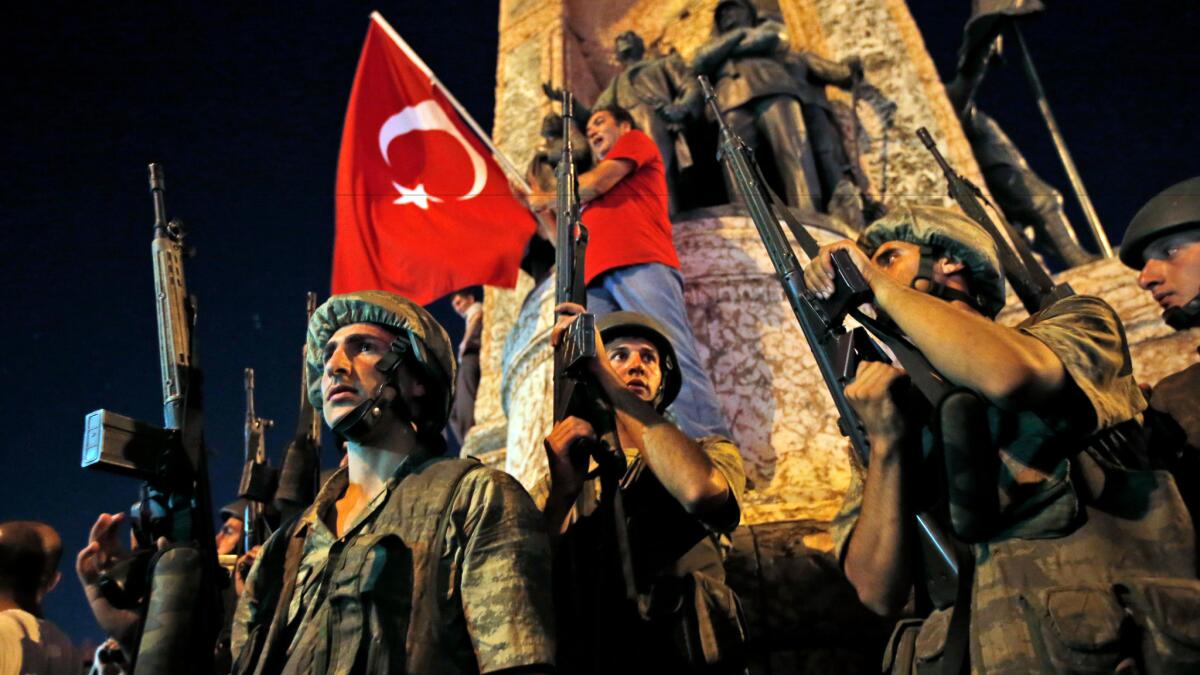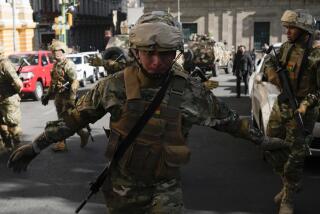In Turkey, frightening moments of a coup attempt, with orders sent via a social media app

- Share via
Reporting from Istanbul, Turkey — The Turkish police officer boarded a crowded commuter bus heading toward Ataturk International Airport in Istanbul and snatched the keys from the driver, leaving him and the passengers in stunned silence.
A moment later, the driver at least managed a few words.
“I don’t know what’s going on,” he told commuters heading home at 10:50 p.m. last Friday on the E5, Istanbul’s major east-west artery.
Almost immediately, dozens of lightly armed police officers showed up, parking their minivans across the eight-lane thoroughfare, causing a traffic jam that stretched for miles. The police had come to preempt soldiers, who soon appeared in military jeeps to confront them.
“Go home. Don’t look!” shouted soldiers toting machine guns and wearing camouflage and body armor.
Seconds later, bursts of automatic gunfire sent onlookers running, as soldiers and police battled to gain control of the road.
Thousands of commuters, among them families with children, left their cars and looked for cover. But barriers along the roadside meant the only way to run was farther along the contested highway.
“Soldiers are coming. They are firing; they are fighting police!” screamed pedestrians streaming onto the road from exit and entry ramps.
As people in Turkey began realizing last week that a military coup attempt was underway, either through their own harrowing experiences or televised comments by Prime Minister Binali Yildirim, many also learned that soldiers trying to take over the government appeared to be using the popular WhatsApp social media platform to communicate.
Urgent orders and updates were being sent via the app to different units across the country, according to Turkish prosecutors, who have shared transcripts of the messages exchanged that night.
“Important announcements here,” said an account with a username of Maj. Murat Celebioglu said shortly after 9 p.m. “Important developments will be sent from here to Ankara.”
While the authenticity of the correspondences cannot be independently verified, much of the information shared on the app matches accounts from witnesses in Istanbul during the first few hours of the coup attempt, as would-be putschists mobilized to take control of transportation infrastructure, state-run media and police and municipal headquarters.
The transcripts show the participants in the attempted coup were hoping for support from the public, large parts of which had become antagonistic toward President Recep Tayyip Erdogan and his increasingly autocratic rule. When the support did not materialize, the soldiers were ordered to open fire.
The soldiers named their WhatsApp group “Peace at home,” a reference to a slogan used by the country’s founder, Mustafa Kemal Ataturk, who, in 1931, described the new nation’s foreign policy with the phrase “Peace at home, peace in the world.”
At strategic points across Istanbul and Ankara, the capital, on the night of the attempted coup, the military units met resistance from police and government supporters who had caught on to the plan.
The bridges, the only way to move tanks and vehicles from the eastern to the western side of Istanbul, were important targets for the soldiers.
“First bridge’s entry from Europe partly blocked … Second bridge police checkpoint entered. Police listening to orders. Appears to be no problem,” reported Maj. Muammer Aygar at 9:43 p.m.
Intense clashes would occur at the bridges.
In other parts of Istanbul, the putschists tried to get support from senior civil servants and police officers.
“In Fatih, is the situation positive or negative?” asked one officer on the group at 9:43 p.m., referring to the conservative central district housing the police and municipal headquarters.
At the Istanbul police headquarters in Fatih, coup plotters were counting on allies on the force.
“Police Assistant Manager following orders. He was informed. A large part following orders,” Celebioglu wrote shortly after 10 p.m.
“To my police friends, I kiss your eyes,” wrote Armored Brigade Deputy Cmdr. Albay Uzay Sahin.
But thousands of government supporters and police reinforcements soon arrived at the police headquarters to thwart the soldiers.
Yildirim appeared briefly on television to say the coup would soon be thwarted.
Then early Saturday morning, Erdogan spoke via Facetime live on CNN Turk, telling residents to enter the streets and help police dislodge the soldiers who were taking over key points in Ankara and Istanbul.
On the E5 highway, rumors were circulating: Erdogan, who had been in Marmaris, was going to the Ataturk airport and he wanted the country to welcome him there in person. On side roads that skirted the roadblocks on the highway, police vans and fire engines with sirens blaring led convoys of flag-waving civilians converging on the airport.
See the most-read stories in World News this hour »
At the offices of a disaster-management agency near the airport, commanders of units that were part of the coup asked what to do about approaching civilians.
“Repeat. Open fire to disperse crowds,” Col. Muzaffer Duzenli said on the app.
Nevertheless, government supporters pressed on, penetrating military perimeters across Istanbul.
Shortly before 3 a.m., a crowd of tens of thousands greeted Erdogan as his plane landed. The president later gave a hastily arranged news conference from a meeting room at the airport and delivered a simple message: The coup attempt had failed.
“Those who did this thought they knew what would happen, but it didn’t happen that way,” Erdogan said. “You are not allowed to direct your guns at your own people, and you did that, so you will pay for it in the gravest way.”
Farooq is a special correspondent.
MORE WORLD NEWS
With smuggled sperm, Palestinians sire children from behind Israeli prison bars
North Korea launches three more missiles, Seoul says
Turkey’s purge after failed military coup includes thousands of officials suspended Monday
More to Read
Sign up for Essential California
The most important California stories and recommendations in your inbox every morning.
You may occasionally receive promotional content from the Los Angeles Times.










